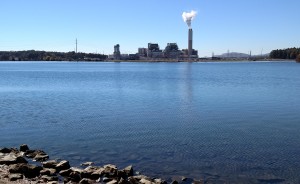Article by Frank Taylor
Carolina Public Press
Duke Energy-Progress’ request to replace its coal-fired power plant at Asheville’s Lake Julian with two natural gas units has received a green light from North Carolina Utilities Commission staff. But part of the energy company’s proposal, to obtain permission now for a contingency plant that might be needed by 2024, was rejected as unwarranted at this time.
The Utilities Commission is expected to give its staff recommendations heavy weight when the board meets Monday to decide on the fate of Duke’s petition for a certificate of public convenience and necessity for the project.
“Duke Energy-Progress’ request that the certificate of public convenience and necessity include the construction of a 186 megawatt (winter rating) natural gas-fired contingent … unit at the Asheville plant is problematic,” wrote commission staff in their agenda report for Monday’s session, which was released late Wednesday.
The report notes that such a plant would only take two years to build once it’s approved, which would allow plenty of time for it to be permitted later, should the expected need materialize by the projected date of 2024.
“Not granting a (certificate) for the additional … unit will allow time for advances in generation, transmission and storage technologies that may provide other least costly resource options for the Company to consider …,” the report said.
One of the two signatories on the recommendation, Utilities Commission Electric Division Director James McLawhorn, talked with Carolina Public Press by telephone Wednesday about their reasoning. “Other technologies could advance and become more mainstream during that time period,” he said.
The staff recommendation parallels the result demanded by many speakers at an Asheville public hearing on the issue in January. Many speakers warned about continued reliance on fossil fuels, which contribute to greenhouse gases and global warming. While several environmental advocates called for outright rejection of the entire proposal, others suggested that denying the contingent plant was an acceptable and reasonable outcome.
But McLawhorn said the staff recommendation is only coincidentally in line with what those speakers demanded. Although he and other staff did attend the hearing and listened to the views of those who addressed the event, current North Carolina law and policy don’t allow for global warming concerns to be a consideration in determining whether Duke gets its certificate, he said.
In this specific case the commission is guided by a statute that prefers the replacement of the coal-fired plant with natural gas-burning plants at the site, McLawhorn noted.
Duke Energy has a considerable stake riding on Monday’s Utilities Commission decision. In addition to approving or rejecting the company’s overall plan, getting the requested certificate will decide whether Duke is allowed a grace period of several years in cleaning up coal ash at Lake Julian. If the project is denied, the deadline for Duke to clean up the ash moves up.
In response to a request for comment from CPP, Duke spokesperson Meghan Musgrave Miles issued the following statement: “We appreciate the Public Staff’s thorough investigation into the Western Carolinas Modernization Project (certificate of public convenience and necessity) application, and look forward to the opportunity to explain the customer benefits of the Duke Energy Progress plan for a smarter, cleaner energy future at the (N.C. Utilities Commission) meeting on Feb. 22.”
Carolina Public Press (www.carolinapublicpress.org) is a nonprofit news organization focused on in-depth and investigative reporting in Western North Carolina.
Editor’s note: for additional background information on Duke Energy’s application and environmental advocates’ responses, please see our article Regulatory process for new Duke Energy plant speeds down fast track.




Three locals unattached to the usual nonprofits separately took it upon ourselves to enter NCUC Petition to Intervene submittals on these matters. I was one of those citizens. As far as I can tell citizens who are not already energy issues insiders have never done this. I submitted my Petition to Intervene first followed by Brad Rouse and Richard Fireman.
And that’s part of history!